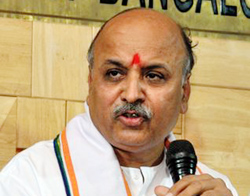Guwahati, Feb 12: The Assam government has banned the right wing group Vishwa Hindu Parishad's leader Praveen Togadia from entering Guwahati, Times Now reported. This comes couple of days after Togadia was denied entry to Bengaluru on apprehension that his provocative speech might disturb the communal harmony.
Togadia was scheduled to participate in a VHP convention (Hindu Viraat Samavesha) in Bengaluru on February 8. Law-enforcing agencies in many states, including Karnataka have registered 19 criminal cases against Togadia for allegedly making inflammatory statements and disrespecting the constitution in the recent past.
It is not the first time that Togadia's planned visit to Assam has come under scrutiny. Back in 2003, the VHP leader was warned by the state chief minister Tarun Gogoi.
"If necessary, we will consider banning his next visit if it is found that it disturbs peace and communal harmony prevailing in the state," Gogoi had warned in a press conference then.





Comments
Add new comment